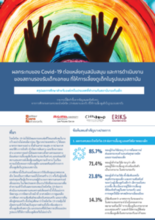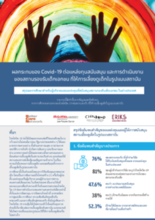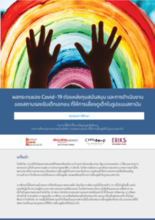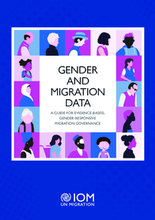Displaying 2951 - 2960 of 14390
This study assesses and maps the legal, policy and procedural frameworks in both domestic and international law across Nepal, Uganda and Cambodia, where orphanage trafficking continues to undermine domestic efforts to stem the overuse of institutionalisation of children.
โควิด-19 ก่อให้เกิดการหยุดชะงักอย่างไม่เคยปรากฏมาก่อนในระดับโลก รัฐบาลบังคับใช้มาตรการด้านสาธารณสุขในวงกว้าง ซึ่งรวมถึงคำสั่งให้อยู่บ้าน เคอร์ฟิว และข้อจำกัดการเดินทาง มาตรการเหล่านี้มีผลกระทบทั้งทางตรงและทางอ้อมต่อการจัดหาบริการดูแลเด็กในที่พักอา
การศึกษานี้เป็นงานวิจัยเชิงคุณภาพขนาดเล็กที่เกี่ยวข้องกับการสัมภาษณ์แบบกึ่งโครงสร้าง 21 ครั้งกับผู้ก่อตั้ง ผู้ให้ทุน และผู้อำนวยการ RCI ใน 7 ประเทศ ได้รับการออกแบบมาเพื่อให้เข้าใจผลกระทบของโควิด-19 ได้ดีขึ้นในการดำเนินงานของสถาบันการดูแลที่อยู่อาศัย ซึ่งรวมถึงการจัดหาเงินทุน การจัดหาบุคลากร อาสาสมัคร การดูแลเด็ก การศึกษา ความสัมพันธ์ในครอบครัว และการรวมตัวกลับคืนสู่สังคม
เอกสารสรุปนี้ดึงข้อมูลและผลการวิจัยจากรายงาน: ผลกระทบของ COVID-19 ต่อสถาบันการดูแลที่อยู่อาศัยที่ดำเนินการโดยเอกชน: ข้อมูลเชิงลึกและนัยสำหรับการสนับสนุนและการให้ความรู้
The purpose of the study is to understand the impact of COVID-19 on alternative care space in South Asian countries, its effect on the children living in alternative care, and to understand the measures taken by respective governments in these countries to support them during the pandemic.
Catholic Care for Children (CCC) is a visionary initiative, led by Catholic sisters, to see children growing up in safe, nurturing families. Guided by the biblical mandate to care for the most vulnerable and animated by the principles of Catholic Social Teaching—especially the dignity of each person—CCC teams are reducing the need for institutional care by encouraging and facilitating family- and community-based care for children.
This paper promotes a system strengthening approach to care reform. It begins with an explanation of child protection and care and the relationship between these two concepts. It goes on to explain why system strengthening is needed to improve children’s care, and how care reform can be carried out systematically, using a range of examples from across the Eastern and Southern Africa region. The paper is aimed at UNICEF country office staff, government and others working on children’s care and protection in the region.
This episode focuses on the current reality of reunification across the public child welfare system. Listeners will hear a conversation among child welfare professionals, members of the American Bar Association (ABA) Center on Children and the Law(opens in new window), the Children’s Bureau, and an alumnus of foster care.
This guidance note aims to address the migration data gaps in a manner relevant to all stakeholders, and promotes a whole-of-society approach. It is also meant to help operationalize IOM’s Migration Data Strategy and includes recommendations on enhancing gender indicators and gender-based methods in data production, protection, dissemination and use. The note provides succinct information on the extent to which gender is captured through macrolevel global data sets, along with a discussion of key issues relevant to gender and migration data.
The purpose of Policies and Practice: A Guide to Gender-Responsive Implementation of the GCM is to provide clear, concrete and practical guidance to governments and other key stakeholders on gender-responsive implementation of the Global Compact for Safe, Orderly and Regular Migration (GCM). Building on the gender-responsive approach outlined in the guiding principles of the GCM, this guide prioritizes the specific needs, challenges and vulnerable situations of women, girls and gender non-conforming people at all stages of migration due to their increased vulnerabilities to human rights violations and gender-based discrimination. It takes into consideration the multiple and intersecting forms of discrimination they may face while highlighting the positive contributions that they make in countries of origin, transit, and destination.









